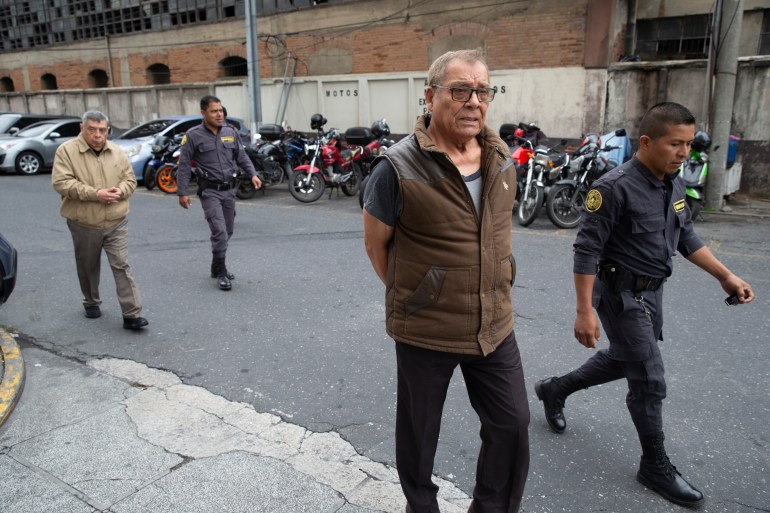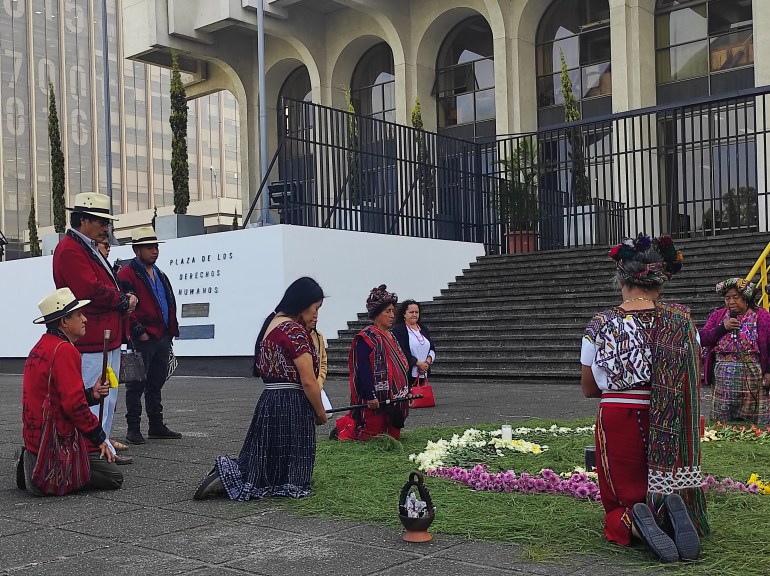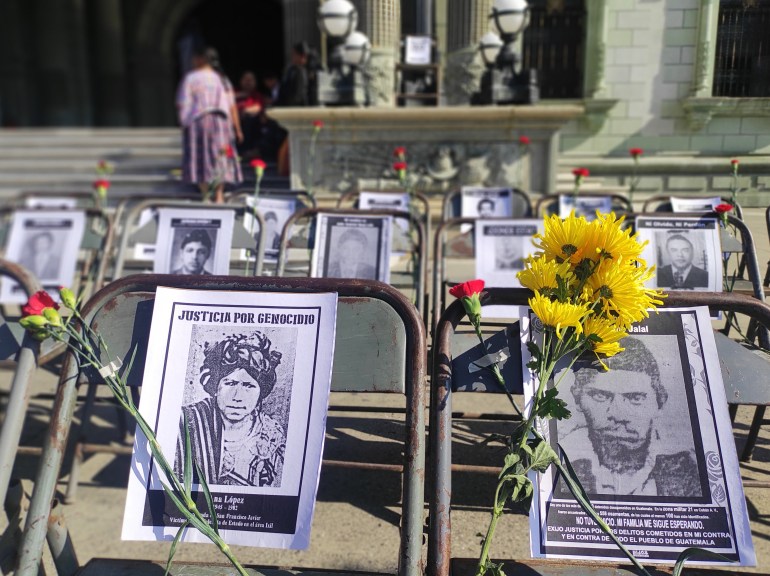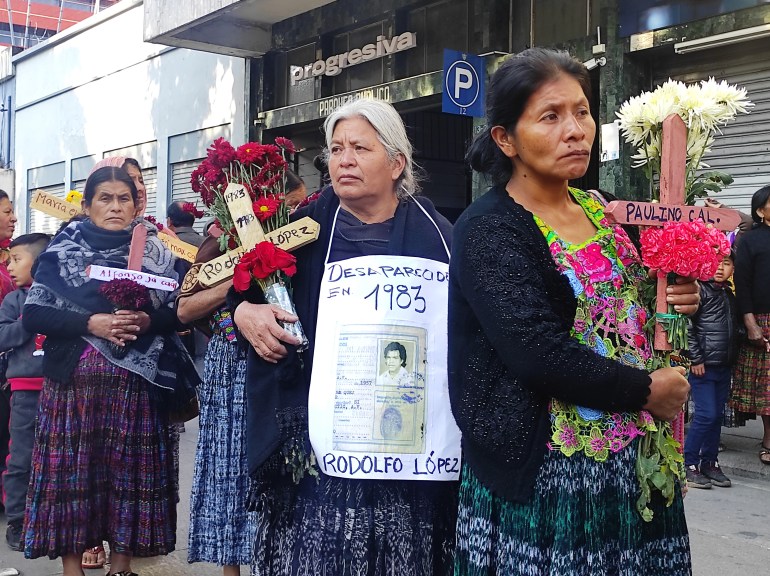ARTICLE AD
Warning: This article contains details of violence that may be upsetting.
Guatemala City, Guatemala – Jesus Tecu remembers wrapping his little brother in his arms in an attempt to protect the two-year-old from the horrors unfolding around them.
It was March 13, 1982, and their village of Rio Negro — a Maya Achi community situated along a river in central Guatemala — was under attack. Guatemala was in the midst of a grisly civil war, and army and paramilitary forces had been stalking the countryside, razing Indigenous villages to the ground.
Already, Tecu’s parents had been among the dozens of Rio Negro residents slaughtered just one month prior in another village. But now soldiers and paramilitary patrolmen were in the town, and 10-year-old Tecu hoped to shield his brother from the killings and rapes they were witnessing.
A patrolman decided to take Tecu to be his household servant, but he did not want to bring home a toddler too. Ignoring Tecu’s desperate pleas, the patrolman grabbed the two-year-old from his arms, smashed him against rocks and threw his body into a ravine.
An estimated 107 children and 70 women died in Rio Negro that day. Tecu and 16 other children survived only because they were chosen to be servants.
Now, Tecu hopes a criminal case in Guatemala can offer a shred of accountability for atrocities thousands of Indigenous people experienced during that period.
“We have never stopped seeking justice,” said Tecu, who has spent the last 30 years as a human rights activist and advocate for community rebuilding.
On Friday, Manuel Benedicto Lucas Garcia, the former head of Guatemala’s army, is slated to stand trial for genocide. It is the latest chapter in the country’s fitful, stop-and-start efforts to achieve justice for the systematic killing of Guatemala’s Indigenous peoples.
An estimated 200,000 people were killed during the war, which stretched from 1960 to 1996. More than 80 percent were Indigenous Maya.
A United Nations-backed truth commission found that the military committed acts of genocide against five of the country’s 22 different Maya peoples between 1981 and 1983. That period overlaps with Lucas Garcia’s tenure as the chief of the general staff of the army.
For seven months between 1981 and 1982, Lucas Garcia helmed Guatemala’s forces, as part of the administration of President Romeo Lucas Garcia, his brother. He now stands accused of genocide, crimes against humanity, forced disappearances and sexual violence.
But Tecu points out that time is running out for survivors to find justice. Decades have passed since the war’s end. Alleged perpetrators like Lucas Garcia, 91, are growing old — and in many cases, dying.
“The importance of this case is that there is an intellectual author alive,” Tecu told Al Jazeera. “He needs to be held accountable for what happened with the deaths of so many children, women and men.”
 Benedicto Lucas Garcia, second from right, walks with a fellow military leader, Manuel Callejas, on their way to court in Guatemala City, Guatemala, on November 25, 2019 [Moises Castillo/AP Photo]
Benedicto Lucas Garcia, second from right, walks with a fellow military leader, Manuel Callejas, on their way to court in Guatemala City, Guatemala, on November 25, 2019 [Moises Castillo/AP Photo]
Delay tactics
Lucas Garcia, however, has denied wrongdoing. Rather, in a live video feed on March 25, he told Guatemala’s High Risk Court A, “I am a national hero”, though he later clarified he meant it in reference to accomplishments unrelated to the armed conflict.
The March 25 hearing came after a year of postponements. Expecting the trial to start, genocide survivors had gathered outside the courthouse in Guatemala City to hold a ceremony in support of the proceedings.
But one of Lucas Garcia’s two lawyers had announced her resignation just days ahead of the hearing, and then the other quit too — something critics believe was a tactic to further delay the trial.
Ultimately, Lucas Garcia accepted to use a public defender and was permitted to continue to attend hearings by video conference while recovering from surgery. The trial’s start date was rescheduled for April 5, to give the new lawyer time to prepare.
“We know these are all manoeuvres and strategies that Benedicto Lucas Garcia is using,” said Diego Ceto, a Maya Ixil leader providing support for witnesses and survivors during the trial.
Speaking to Al Jazeera on the courthouse steps right after the postponement, Ceto explained that other defendants have likewise used stalling techniques to evade justice.
After all, one of Lucas Garcia’s co-defendants — a former head of military operations — died in 2020. And in January, another — a former head of military intelligence — was found mentally unfit to stand trial and will face separate proceedings.
“They look for any justification to avoid the start of the trial,” Ceto said. “Nevertheless, as Ixils we will continue to insist on the pursuit of the truth.”
 Maya Ixil women take part in a ceremony outside the Guatemala City court complex on March 25, before the genocide trial of Benedicto Lucas Garcia was postponed to April 5 [Sandra Cuffe/Al Jazeera]
Maya Ixil women take part in a ceremony outside the Guatemala City court complex on March 25, before the genocide trial of Benedicto Lucas Garcia was postponed to April 5 [Sandra Cuffe/Al Jazeera]
From the Ixil region and beyond
The area Ceto is from is at the heart of the ongoing case. Prosecutors are focusing on crimes allegedly committed in the Maya Ixil region, 225km (140 miles) northwest of the capital.
More than 30 massacres were carried out under Lucas Garcia’s command and at least 23 Ixil villages were completely destroyed, the plaintiffs’ lawyers have said. The prosecution plans to present more than 80 experts and 150 witnesses as part of the trial.
Evidence also includes forensic reports from exhumations and military documents lawyers say will help establish the genocidal intent behind the crimes.
Atrocities in the Maya Ixil region also formed the centrepiece of another historic trial: that of the late military ruler Efrain Rios Montt, who took power from Romeo Lucas Garcia in a military coup.
In 2013, Guatemala made history when a court convicted Rios Montt of genocide. But the verdict was overturned soon after in a widely-questioned ruling, illustrating the difficulties of prosecuting such a case.
Rios Montt died before a partial retrial could end in 2018. On September 27 of that year, a tribunal ruled the military did commit genocide, but no one was convicted.
Advocates, however, emphasise that the atrocities perpetuated by Rios Montt and others extended beyond the Mayan Ixil people, also targeting other Indigenous peoples, unions, clergy, student movements and other groups.
For example, in a separate case from 2018, Lucas Garcia was convicted of rape, forced disappearance, and crimes against humanity for actions taken against an activist and her family. He was sentenced to 58 years in prison.
In June 2023, however, an appeals court ordered Lucas Garcia’s release, along with that of his co-defendants. However, he remained in custody due to a pretrial detention order in the genocide case.
In another case that has yet to go to trial, Lucas Garcia is one of several former officials accused of crimes in connection with more than 550 human remains exhumed from mass graves on a military base.
“Right now we are on the Ixil case, but the destruction was not just in the Ixil area,” said Eleodoro Osorio, a representative of the Association for Justice and Reconciliation (AJR), an organisation of survivors and relatives from five of the hardest-hit Indigenous regions.
 More than 200,000 people, most of them Indigenous Maya civilians, were killed during the armed conflict in Guatemala between 1960 and 1996 [Sandra Cuffe/Al Jazeera]
More than 200,000 people, most of them Indigenous Maya civilians, were killed during the armed conflict in Guatemala between 1960 and 1996 [Sandra Cuffe/Al Jazeera]
Power of grassroots movements
Osorio’s group formed in 2000. That same year, it filed a formal legal complaint against Romeo Lucas Garcia for genocide, followed by one against Rios Montt the following year. Those legal actions eventually led to the prosecutions of Rios Montt and Benedicto Lucas Garcia, the army leader currently facing charges.
AJR has joint plaintiff status in Lucas Garcia’s trial, allowing its own legal team to intervene on behalf of victims alongside the prosecution.
The group’s participation improves the outlook for a successful conviction, according to Naomi Roht-Arriaza, a law professor at the University of California College of the Law in San Francisco.
She pointed out that grassroots movements can help exert pressure on Guatemala’s legal system, which has seen the erosion of judicial and prosecutorial independence in recent years.
“In the trials that we’ve seen in Latin America, that has been the case. It’s been the lawyers for the victims that have basically carried the lion’s share of the actual work,” said Roht-Arriaza, who was a legal adviser in a similar case brought against Rios Montt in Spain.
She sees the pursuit of justice in Guatemala as part of a broader regional phenomenon.
“I think Latin America has been the leader in holding national trials around massive violations of human rights. So it’s not just Guatemala. It’s also Argentina and Chile, Colombia, [and] to some extent Peru,” she told Al Jazeera.
The bulk of genocide prosecutions have been in international courts, not domestic ones, according to Mark Berlin, a political science professor at Marquette University in Wisconsin whose research focuses on accountability for human rights violations and war crimes.
He explained that “atrocity crimes” — including genocide and crimes against humanity — are usually committed by state actors, and states are unlikely to prosecute themselves.
So when a country does prosecute genocide within its own borders, it is often the result of shifting power dynamics in the government itself.
“It’s usually when a group that was previously targeted is able to come to power and use that power to then target for prosecution those who were previously in power,” Berlin told Al Jazeera, pointing to the aftermath of the Rwandan genocide as an example of that dynamic.
The situation in Guatemala was different, though, he said. “Given that those conditions do not exist in Guatemala, the odds were stacked against the possibility for Guatemala to be able to carry out genocide prosecutions.”
Still, Berlin said other factors, including foreign assistance and forensic work, helped enable the genocide prosecutions to move forward.
“Guatemala did have kind of a perfect storm of other kinds of factors that did make it able to carry out these prosecutions,” he said.
“One was — or continues to be — the existence of a very active and well-organised social movement, a very tenacious and persistent social movement that has been calling for accountability for decades.”
 Grassroots movements are credited with driving legal campaigns to prosecute the civilian deaths and forced disappearances during the decades-long Guatemalan civil war [Sandra Cuffe/Al Jazeera]
Grassroots movements are credited with driving legal campaigns to prosecute the civilian deaths and forced disappearances during the decades-long Guatemalan civil war [Sandra Cuffe/Al Jazeera]
Half the battle
But now that Lucas Garcia is about to be brought to trial, efforts to secure a conviction present new hurdles.
Prosecuting genocide is considered more complex than it is for other human rights violations and crimes against humanity, due to legal elements set out in the 1948 Genocide Convention and incorporated into Guatemala’s criminal code in 1973.
“You have to demonstrate that the actor or the accused had the intent to destroy, in whole or in part, a group of people,” said Geoff Dancy, a political science professor at the University of Toronto.
“That is very difficult to demonstrate and has only been successfully demonstrated in a few cases, really.”
There have been about 105 trials involving genocide charges in 15 countries around the world, according to Dancy, who is a principal investigator in a research project compiling and analysing global data on transitional justice mechanisms, including human rights prosecutions.
But even if prosecutors are not successful in convicting figures like Lucas Garcia of genocide, Dancy said the trials can still be useful tools for justice.
He pointed out that even though leaders like Guatemala’s Rios Montt, Serbia’s Slobodan Milosevic and Chile’s Augusto Pinochet died while prosecution efforts were still under way, the cases were still incredibly important, helping to unearth injustices and put them into the public record.
Ultimately, Dancy said, it is “really important to get these things on the map and have the evidence produced and considered by a court”.

 9 months ago
62
9 months ago
62 